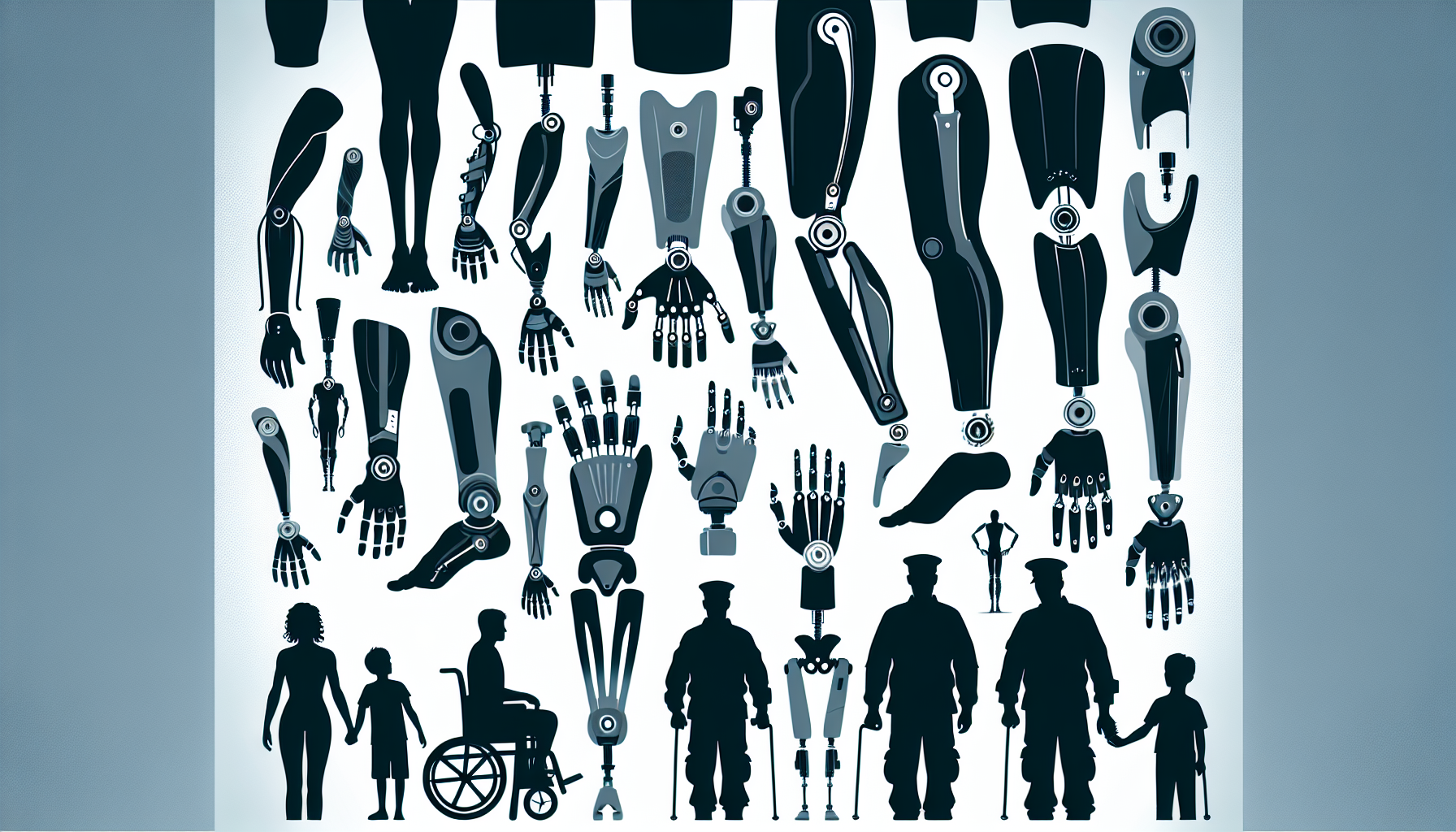Definition
The VA benefits term “Prosthetics” refers to artificial devices used to replace missing or nonfunctional body parts, which can improve the quality of life for veterans who have experienced injuries or disability. These devices can include limbs, eyes, orthopedic braces, or hearing aids. The Department of Veterans Affairs (VA) provides access to prosthetic appliances and services to eligible veterans to help them regain independence and mobility.
Key Takeaways
- Prosthetics provided by VA benefits cover a wide range of devices and services, including artificial limbs, orthopedic braces, adaptive equipment, and hearing aids for eligible veterans.
- Veterans who have lost a limb, have a disability that affects their mobility, or suffer from hearing loss as a result of their military service are often eligible for these prosthetic benefits through the Department of Veterans Affairs.
- VA prosthetics benefits aim to improve the quality of life and functionality of beneficiaries, enabling them to participate in activities of daily living and maintain their independence.
Importance
The VA benefits term “Prosthetics” is important because it refers to the vital support and services provided by the Department of Veterans Affairs (VA) to veterans who require prosthetic devices, orthotics, or sensory aids as a result of an injury or medical condition sustained during their military service.
This ensures that eligible veterans have access to the appropriate technology and care necessary to achieve an optimal level of physical functionality, independence, and overall quality of life.
The VA’s Prosthetic & Sensory Aids Service (PSAS) is dedicated to providing customized, high-quality solutions that address individual needs, enhancing the veterans’ ability to reintegrate into society and lead fulfilling lives.
Explanation
The purpose of prosthetics within the realm of VA benefits is to provide veterans with the highest quality of life by restoring their mobility, functionality, and independence after losing a limb or experiencing a debilitating injury. Prosthetic devices play a critical role in rehabilitation and recovery, ensuring the individual is empowered to continue leading a fulfilling life post-injury. VA benefits cover a wide range of cutting-edge prosthetic technology, enabling the veteran to receive personalized solutions tailored to their unique needs and individual circumstances.
Moreover, the VA works closely with prosthetic experts as well as funding research and development in this field, enabling access to the latest innovations and advancements, ensuring veterans receive the best possible care. Apart from providing these prosthetic devices, the VA benefits also include the necessary healthcare services, resources, and support systems to help veterans integrate these devices into their lives. This includes physical therapy, occupational therapy, and access to specialists who offer guidance and training on using prosthetics effectively and safely.
Furthermore, the VA’s comprehensive approach extends beyond physical recovery, encompassing mental and emotional well-being. Veterans are connected with resources for coping with the psychological impacts of their injuries and the resulting changes, reinforcing their resilience and determination to thrive despite their circumstances. Overall, the VA’s prosthetic benefits encompass not just the provision of the devices themselves but a holistic approach to ensure the overall wellness and success of the veterans.
Examples of Prosthetics
Advanced Prosthetic Limbs: Veterans who have experienced limb loss due to injury or illness can take advantage of VA prosthetic benefits by receiving advanced prosthetic limbs. One example is the DEKA Arm, often referred to as the “Luke Skywalker arm,” which uses electrical signals generated by the wearer’s muscles to control the device and offers a more precise and natural range of motion compared to traditional prosthetics.
Custom Orthotic Devices: Some veterans suffer from conditions that require specialized support for their musculoskeletal system, such as custom orthotic devices for the foot, ankle, or leg. A real-world example is a brace specifically designed to correct foot drop caused by nerve or muscle damage, which can help a veteran walk more comfortably and with greater stability.
Robotic Exoskeletons: VA Benefits may provide access to cutting-edge technology, such as robotic exoskeletons that help paralyzed veterans regain some mobility. Examples include the ReWalk system, which uses a motorized exoskeleton to enable individuals with spinal cord injuries to stand upright, walk, and even climb stairs, and the Indego Exoskeleton, which offers similar capabilities to the ReWalk but is lighter and more modular, allowing for greater customization based on the wearer’s needs.
FAQs about VA Prosthetics Benefits
1. What prosthetic services are available to eligible veterans through the VA?
The VA offers a wide range of prosthetic services for eligible veterans, including prosthetic limbs, orthotic devices, hearing aids, eyeglasses, adaptive equipment, and more. The prosthetic services are tailored to meet the individual needs of each veteran.
2. Who is eligible for VA prosthetic benefits?
Veterans who are enrolled in VA health care are eligible for prosthetic benefits. The eligibility depends on factors such as the veteran’s service-connected disability status, and the medical need for the prosthetic device or service.
3. How can I apply for VA prosthetic benefits?
To apply for VA prosthetic benefits, you must be enrolled in VA health care. To enroll, you can apply online at VA.gov, by phone at 1-877-222-VETS (8387), or in person at your local VA medical center or clinic. Once enrolled, your VA health care provider will determine your needs and make a referral to the prosthetic department.
4. Can I choose my own prosthetist?
The VA allows you to choose your own prosthetist under certain circumstances. You can request a specific provider if they are an approved VA vendor, and your VA health care provider believes that the request is in your best medical interest.
5. Will the VA cover the cost of repairing or replacing my prosthetic device?
Yes, the VA will cover the cost of repairing or replacing a prosthetic device, as long as it meets the VA’s criteria for medical necessity and the device was originally provided by the VA or another source approved by the VA.
6. How often can I get a new prosthetic device?
The frequency at which you can receive a new prosthetic device varies based on factors such as the type of device, wear and tear, changes in your medical condition, and advances in technology. The decision to replace a prosthetic device will be made by your VA health care provider in consultation with the prosthetic department.
7. What should I do if I have a problem with my prosthetic device?
If you have a problem with your prosthetic device, contact your VA health care provider, prosthetist, or your local VA prosthetic department. They can assist you with troubleshooting, adjustments, repairs, or replacement of the device, if necessary.
Related VA Benefit Terms
- Artificial limbs
- Orthotic devices
- Assistive technology
- Adaptive equipment
- Rehabilitation services
Sources for More Information
- U.S. Department of Veterans Affairs: Prosthetic & Sensory Aids Service
- U.S. Department of Veterans Affairs: VA Prosthetic Services
- Amputee Coalition
- Wounded Warrior Project
 Benefits.com Advisors
Benefits.com Advisors
With expertise spanning local, state, and federal benefit programs, our team is dedicated to guiding individuals towards the perfect program tailored to their unique circumstances.
Rise to the top with Peak Benefits!
Join our Peak Benefits Newsletter for the latest news, resources, and offers on all things government benefits.


















